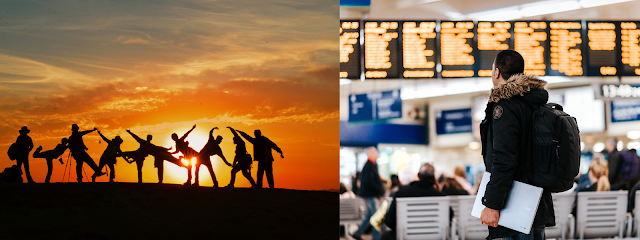Introduction:
Travel and tourism are two terms often used interchangeably, yet they represent distinct concepts that possess different connotations and implications. While both involve moving from one place to another, understanding the difference between travel and tourism is crucial for comprehending their unique characteristics, motivations, and impacts. This article aims to delve into the dissimilarities between these two concepts and shed light on their significance in the realm of exploration and leisure.
I. Definition and Scope:
Travel:
Travel encompasses journeying from one location to another, typically driven by personal motivations such as exploration, adventure, self-discovery, or work-related purposes. It is a broad term that encompasses a range of activities, including leisure travel, business travel, solo travel, group travel, and more. Journeys can be undertaken independently or organized through various means, such as travel agencies or online platforms.
Tourism:
Tourism, on the other hand, refers to the commercial activity of individuals or groups travelling to destinations for recreational, leisure, or business purposes. It involves organized travel, often facilitated by travel agencies, tour operators, and hospitality services. Tourism encompasses activities such as visiting tourist attractions, participating in guided tours, and engaging in leisure and recreational pursuits.
II. Motivations and Mindset:
Travel:
Travel is often motivated by personal aspirations, such as the desire to explore new cultures, seek adventure, expand horizons, and gain a deeper understanding of the world. The mindset of travellers revolves around curiosity, open-mindedness, and a willingness to embrace new experiences. Travellers tend to prioritize authentic interactions, local immersion, and self-discovery through their journeys.
Tourism:
Tourism is motivated by a range of factors, including leisure, relaxation, entertainment, escapism, and the desire for predictable and organized experiences. Tourists often seek comfort, convenience, and access to amenities and attractions. Their mindset revolves around enjoyment, rejuvenation, and the consumption of leisure services. Tourists typically prioritize the fulfillment of preconceived expectations and the attainment of relaxation and pleasure.
III. Duration and Flexibility:
Travel:
Travel can vary in duration, ranging from short-term trips to extended periods spent in different locations. It allows for flexibility in terms of choosing destinations, routes, and timeframes. Travellers have the freedom to explore offbeat locations, adapt their plans based on personal preferences, and embrace spontaneous experiences. The focus is often on immersing oneself deeply in the places visited and establishing connections with local communities.
Tourism:
Tourism often follows a predetermined schedule and fixed itineraries, catering to the needs and preferences of a larger number of travellers. Tourists have limited flexibility once they have booked their packages or joined organized tours. The emphasis is on maximizing the number of destinations visited within a specific timeframe, often resulting in a more superficial exploration of each location.
IV. Economic Impacts:
Travel:
Travellers contribute to the local economy through various means, such as spending on accommodation, transportation, dining, shopping, and engaging in local services. However, individual travellers may have a relatively smaller economic impact compared to tourism as a whole, particularly if they opt for budget accommodations or engage in self-guided exploration.
Tourism:
Tourism has a significant economic impact as tourists collectively contribute to the local economy by spending on accommodation, transportation, dining, shopping, attractions, and various services. It generates revenue for local businesses, creates employment opportunities, and stimulates economic growth. Tourism can be a vital source of income for destinations heavily reliant on the tourism industry.
V. Sociocultural and Environmental Considerations:
Travel:
Travellers often prioritize cultural exchange, respect for local customs, and forming meaningful connections with the local population. They seek authentic experiences, support local communities, and promote cultural preservation. Moreover, travelers tend to be more conscious of their environmental impact, striving to reduce waste, support sustainable practices, and explore alternative modes of transportation.
Tourism:
Tourism can have both positive and negative sociocultural impacts. It can contribute to the preservation and promotion of local heritage, foster intercultural understanding, and provide employment opportunities. However, it can also lead to cultural commodification, loss of authenticity, and strained community relations due to over-tourism. Similarly, the environmental impact of tourism, particularly in popular destinations, can include pollution, habitat destruction, and strain on natural resources.
If you want more information please Click Here
Conclusion:
While travel and tourism may share similarities, they possess distinctive characteristics in terms of motivations, mindset, duration, flexibility, economic impacts, and sociocultural and environmental considerations. Recognizing the difference between these concepts allows individuals, communities, and policymakers to appreciate the unique aspects of each and work towards promoting sustainable practices in the realm of exploration and leisure. By striking a balance between personal aspirations and responsible tourism, we can ensure that both travel and tourism contribute positively to the social, cultural, economic, and environmental aspects of our world.















0 Comments